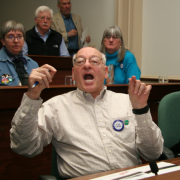|
 Take elections for three statewide officers and eight Executive Board seats, combine more than two dozen committee meetings, add passage of a dozen resolutions and special orders of business, and sprinkle in journalism awards. That’s the basic recipe for UUP’s 2009 Spring Delegate Assembly. Take elections for three statewide officers and eight Executive Board seats, combine more than two dozen committee meetings, add passage of a dozen resolutions and special orders of business, and sprinkle in journalism awards. That’s the basic recipe for UUP’s 2009 Spring Delegate Assembly.
More than 300 delegates gathered in Albany for the Spring DA April 24-25, three weeks after the state Legislature approved a new state budget in the midst of a continuing economic downturn. UUP President Phillip Smith seized the opportunity to give delegates an in-depth analysis of what the budget means to the union and SUNY.
Budget victories
In his State of the Union address, Smith drew applause for some of the victories the union achieved in the budget, including passage of a higher income tax rate on the wealthy that will garner “$4 billion of sorely needed new revenue,” and the defeat of the plan to merge NYSTI with The Egg. He said UUP succeeded in stopping enactment of the Tier V pension plan for new public employees, as well as the plan that would force state employees and retirees to pay a portion of their Medicare Part B premiums. But Smith tempered his enthusiasm, warning that mid-year budget cuts could threaten these gains.
“These issues probably will come back this legislative session,” he cautioned. “I don’t think it’s over, but we’ll be there for you.”
Smith also explained the Legislature rejected the governor’s plan to eliminate the negotiated 3 percent pay increase for this year, noting that UUP said “no” to the suggestion that the union give up its raise.
“There was never any talk that if you give up your raise, this money will go directly to SUNY,” Smith said. “The money was going to go back into the general fund and would have been used for whatever purpose the governor might have wanted.”
UUP also said no to a five-day pay lag, another proposal that lawmakers rejected.
Smith emphasized another significant budget victory in the defeat of SUNY flexibility legislation, which would have allowed campuses to sell or lease their property and implement differential tuition.
“They (also) wanted to engage in potential anti-union activities, such as outsourcing our jobs,” Smith said. “We were successful in preventing all of that.”
Smith said the flexibility proposal is still out there in the form of A./S. 2020, which would give the University at Buffalo such powers. But he predicted the bill would not make it out of committee.
“I think we need to stand shoulder to shoulder and say no to this,” he said.
Reiterating that the budget is precariously balanced and mid-year cuts are likely, Smith readied the delegates for another potential call to action. “We may be calling on you to fax, fax, fax. There are storm clouds on the horizon.”
State budget cuts and their effect on workload dominated the academic delegates meeting. Bruce Altschuler of Oswego said his school has eliminated sabbaticals for next year. Martha Livingston of Old Westbury reported that a wall was removed in her classroom to accommodate more students.
Vice President for Academics Frederick Floss pressed the need to develop a strategy to outline the impact that increased workload has on students.
At the same time, UUP professional delegates listened to a presentation on a survey that measured salary inequity for academics and professionals at a group of SUNY schools statewide.
The presentation by Jamie Dangler was based on a study titled “Gender Inequity,” compiled last year by Dangler and fellow Cortland professor Kathleen Burke.
The study gauged potential salary inequities at Albany, Buffalo, Cobleskill, Cortland, Farmingdale, New Paltz and Plattsburgh, measuring categories such as years of service, rank, salary levels, discretionary salary increases (DSI), market differences and other variables.
While Dangler pointed out “red flags” at several campuses where the potential of gender inequity may exist, the study could provide no definitive proof. Also, there was no consistent pattern in professionals’ salaries, other than those at the university centers where males make more than females in the upper pay grades.
Earlier, Farmingdale delegates Barbara Maertz and Yolanda Pauze
addressed a smaller group of professionals during the Professional Issues Committee, discussing a series of workshops for professionals and academics co-sponsored by the Farmingdale Chapter and the school’s administration.
The workshops focused on issues such as comp time, the grievance process and the College Review Panel.
The DA went beyond speeches, meetings and elections. Smith thanked Gertrude Butera of Alfred, an honorary trustee of UUP’s College Scholarship Fund, for raising $1,537 for the fund through the bidding on dozens of donated homemade gift baskets.
Under the union’s Caring for Communities campaign, members contributed dozens of old eyeglasses to help support Lions Club sight programs. Members also generously contributed canned and boxed food products, as well as cash, to benefit local food banks.
— Donald Feldstein
|


